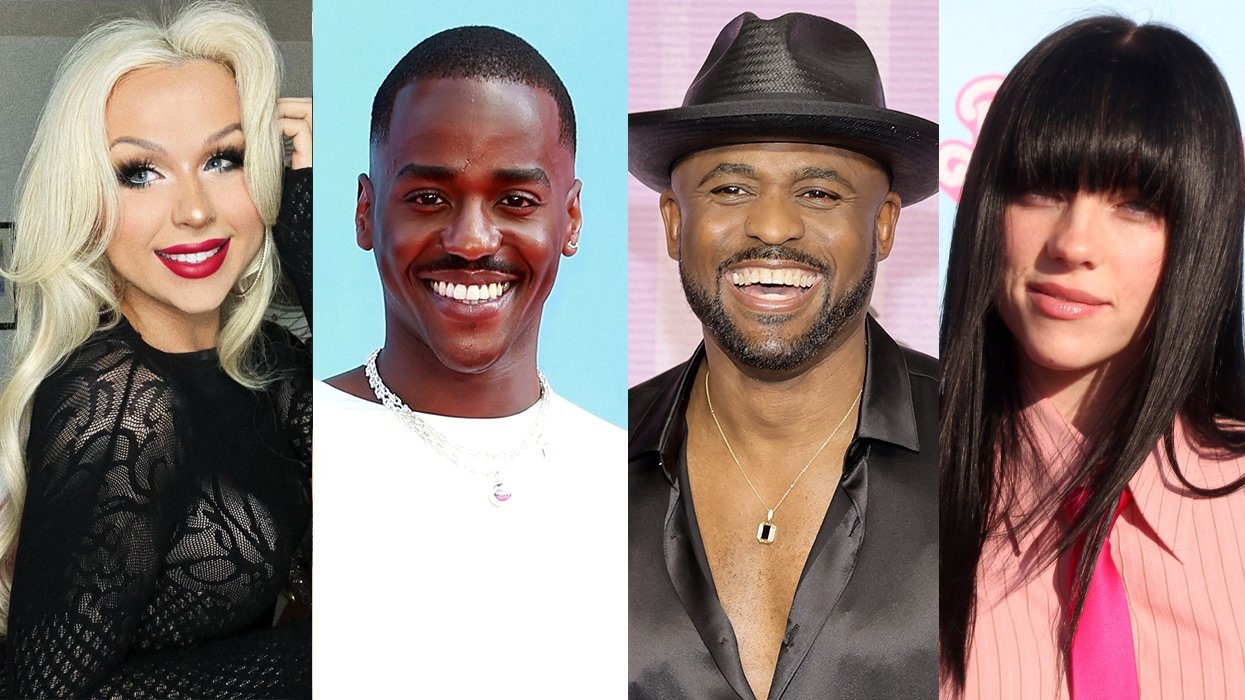Spirit Day is an awesome way to show solidarity. LGBTQ+ students, teachers, administrators, and even celebrities and their allies wear purple to take a stand against LGBTQ+ bullying. While the gesture is an awesome way to show support, here are a few things students, parents, and educators can do to keep the essence of Spirit Day alive all year long.

STUDENTS
1) You don’t have to laugh at jokes that aren’t funny.
If someone is mocking LGBTQ+ people and they expect you to laugh at their crappy joke, the quickest way to shut it down without saying a word is to stare them down in silence until they become so uncomfortable that they start to fidget. When you refuse to go along with anti-LGBTQ "jokes" you sometimes risk putting yourself in the line of fire, especially if you’re in a group of students who are all going along with it. They might get defensive and try to justify their thinly veiled bigotry by saying, "It was just a joke." The best way to reply is to innocently say, "Oh it was? I thought jokes were supposed to be funny."
2) Shut down comments like "That’s so gay."
"That’s so gay," is still one of the most common negative comments students report hearing in schools. It might seem like it’s not the biggest deal—after all, they, "didn’t really mean gay." But when what they meant was that something was gross or stupid, equating it with being gay is really insulting. Go full on Hilary Duff, or just shut it down by saying, "Oh, really, that hat is only sexually attracted to other hats?" or, "Your vocabulary is truly stunning. Really. I don’t know how you do it. Your brain is just like this amazing thesaurus."
3) Treat LGBTQ+ students with respect, and stand with them.
If you’re not an LGBTQ+ student, you can be a great ally in school. Treating all your peers with respect matters. You’ll build a reputation for being a kind, considerate person, and in life after school, that’s the kind of reputation that gets you the great job referrals, good letters of reference, the respect of your coworkers, and a group of interesting and accomplished friends who are way more interested in building themselves and others up than in tearing others down. Bullies don’t go away when you get older. This election proves that. But a lot of high school bullies grow out of their insecurities, and standing up for the safety and happiness of others will ultimately lead to a more fulfilling life.
If you see LGBT students being harassed or bullied, step in or get a teacher involved if safety is an issue. Students who harass LGBTQ+ students think the worst thing they can say is, "Why are you defending them? You must be gay too." They want a reaction. The easiest way to defuse the situation is to say, "Well, I’m not, but there’s nothing wrong with that. I’m defending them because no one deserves to be treated like that."

PARENTS
1) Have open conversations with your children.
If you’re a parent, one of the best things you can do to prevent LGBTQ+ bullying after Spirit Day is to talk to your child about LGBTQ+ rights, and the importance of treating everyone equally. Odds are, you’ll learn a lot from them too. Encourage your children to come to you when they have questions, or if they see a queer classmate getting bullied at school. Often, teenagers do not want their parents to intervene in peer conflicts, so being able to talk through what’s happening and giving them tools and ideas to help your child solve the conflict on their own is important.
2) Model the way you want your child to behave in your own life.
If you’re thinking about ways to end LGBTQ+ bullying, you’re probably already trying to treat everyone with respect, but you might be overlooking a few things. If you make jokes about LGBTQ+ characters on TV, or if you comment on how someone is dressing in a way that doesn’t fit gender norms, that sticks with your child. If you don’t read any books by LGBTQ+ people, or watch any shows that LGBTQ+ people are in, that also sticks. Be clear that all forms of gender expression and all sexual orientations are normal.
3) Get involved at school.
Whether you have an LGBTQ+ child or not, bring up issues of LGBTQ+ equality with teachers and administrators. Ask what teachers are doing to foster an LGBTQ-friendly classroom at the next parent-teacher conference. Ask administrators if the school has a Gay-Straight Alliance club, and if not what they’re doing about that. Attend school board meetings and see if there are any anti-bullying initiatives you can get involved with. You child might be totally embarrassed that you’re such an involved parent in the moment, but a few years down the line they’ll be proud.

EDUCATORS
1) Get involved with your school’s GSA.
If your school doesn’t have a GSA, volunteer to be the advisor. If your school does have a GSA, offer up your classroom after school for meetings, or pitch in for event planning or fundraising. If the GSA students are fighting for changes, like a neutral bathroom at school, be another voice to back them up when they meet with administrators.
2) Have a clear classroom anti-bullying policy.
Get specific about your classroom anti-bullying policy. It’s one thing to say, "Be kind to your peers. No name calling." It’s another to say, "I won’t tolerate any derogatory remarks or names, including anything about race or ethnicity, gender, gender expression, physical or mental disability, sexual orientation, class, mental illness, appearance, or academic ability." This establishes you as a safe person to turn to, and establishes your classroom as a safe place to focus on learning.
3) Make sure students who bully understand why it’s unacceptable.
Often students who get caught bullying are sent to the principal, assigned a week of after school detention, and never really understand why their behavior is unacceptable. If you can, take the time to meet with the student between classes or after school. Make sure you understand what’s going on in their home. Ask them why they target certain students. Let them know their behavior is unacceptable, but try to figure out where it’s coming from too. No student wakes up one morning and decides to harass another student for being gay without any reason. Educators can’t get through to every student, but with the help of parents and students, they might be able to start the conversation.





























































































































